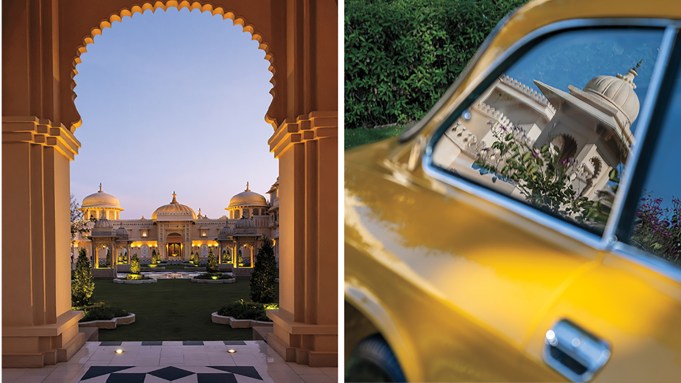Fifteen years ago, when automotive historian Manvendra Singh Barwani approached executives at the Oberoi Group with the idea of bringing a version of the world’s most prestigious car show to the lawns of their grand hotel on the shores of Lake Pichola in Udaipur, India, he was met with a flat no. “We don’t do that,” an Oberoi executive told him, explaining that the crowds and heavy vehicles could be ruinous for the hotel’s pristine grounds. But on a sunny morning this past February, eight 1930s Rolls-Royce limousines were arranged in a perfect semicircle at the gate to the Oberoi’s main courtyard, while an ultrarare 1935 Delahaye roadster was parked on the front lawns, and a 1938 BMW 328, flown in from Munich, sparkled at the edge of a turf-covered roadway built especially for the event. Singh Barwani had won over the company’s current boss, Arjun Oberoi: The hotel had gone all in to host the latest edition of the Concours d’Elegance, which most famously occurs each August at Pebble Beach in Monterey, Calif.
FLOWER POWER | From left: A 1935 Cadillac V-12 overlooking Lake Pichola; the brocade interior of a 1937 Rolls-Royce Phantom III originally commissioned by the Maharani of Baroda; previewing the concours entries before opening day.
Christopher Bagley
Outside of the clubby world of car collectors, many people remain unaware of India’s deep connection to automotive craftsmanship. From the 1910s through the 1940s, the maharajas were an obsessively acquisitive clan of car geeks, ordering Bentleys and Rollses by the boatload for their private caches. Their unorthodox customization requests—hood-mounted searchlights for tiger-hunting expeditions, extra seats for their multiple wives—resulted in some of the most eccentric luxury cars of the era, or indeed of any era. Singh Barwani points out a discreet teak bar with a servant’s seat tucked in the back of a 1927 Rolls-Royce Phantom ordered by the Maharaja of Darbhanga; it was built for a princess who craved a nightly cocktail even though her mother-in-law had forbidden alcohol inside the palace. “The maharaja told her, ‘OK, I’ll get you a car, and you can go out in the evening,’ ” Singh Barwani says. “So every night she was driven around with her lady-in-waiting, who’d make her a drink. She’d have her booze and come back, and the mother-in-law never knew.”

Red Alert | From left: The Maharaja of Mysore, Yaduveer Wadiyar, among cars collected by his ancestors during the days of British rule; a concours guest; a rare 1935 Delahaye in the Oberoi gardens.
Christopher Bagley
Today, although the maharajas’ descendants still possess some of the family cars (and some of the family wealth) along with the honorary royal titles, their influence on Indian society is rivaled by that of the country’s ever-growing crop of billionaire industrialists. It’s no surprise that these nouveau tycoons also like their fancy rides, including textile kingpin Gautam Singhania, whose Mumbai home has 30 stories—several of which are reserved for his collection of Lamborghinis and Ferraris, along with six models, including a 1958 Mercedes Benz 190 SL, that he brought to Udaipur.
The vibe was equal parts gracious camaraderie and fierce competitiveness. “What can you do? It’s a passion.”

TAKE A BOW | At the awards ceremony, a 1950 Austin A90 collects its first-runner-up prize in the category of Postwar European Classics.
Christopher Bagley
On the morning of the event’s opening day, collectors schmoozed around the hotel grounds, where jet-age Cadillacs and curvaceous Hispano-Suizas were artfully scattered among the flower beds, the vibe equal parts gracious camaraderie and fierce competitiveness. To see these mega-moguls spend two days under the blazing sun pitching their vehicles to the judges, all the while eyeing each other’s hood ornaments, was to understand the depth of their commitment. “What can you do? It’s a passion,” said Rajiv Kehr, a New Delhi–based collector who’d shipped one of his favorite Jaguars—a fetching 1950 XK series, with its iconic leather bonnet strap—to the competition and was excited to drive it home along Rajasthan’s chaotic highways.

THAT EXTRA POLISH | From left: Tuning up a 1959 Corvette roadster; panel judge Jodie Kidd; polishing a 1950 Jaguar XK just after sunrise.
Christopher Bagley
At the closing ceremony on Sunday, Sandra Button, the longtime chairperson of the Pebble Beach Concours d’Elegance, who oversaw the panel of judges at the Oberoi’s inaugural effort, awarded the Best of Show trophy to a gracefully zippy 1939 Lagonda coupe. Owner Nishant Dossa, along with the winners in more than a dozen categories who smiled and waved as they motored past the Oberoi’s gate, knew that the awards will greatly boost the value of their cars.
One 1927 Rolls-Royce Phantom has a teak bar in back. “Every night [the princess] was driven around with her lady-in-waiting, who’d make her a drink.”

VICTORY LAP | From left: The Best of Show winner, a 1939 Lagonda; hotel honcho Arjun Singh Oberoi; a 1927 Rolls-Royce New Phantom with bodywork later changed to a Barker Limousine.
Christopher Bagley
Still, many collectors insisted that cash and prizes weren’t top of mind. One vehicle that drew gawkers throughout the weekend was a Rolls-Royce Phantom III in mauve and lilac, originally customized in Paris for the Maharani of Baroda with solid-gold fittings and an ivory steering wheel. Collector Asheesh Jain described how he’d traveled to Varanasi, in northern India, and spent several weeks at a fabric workshop there to reproduce the ornate brocade that covers the car’s rear interior from floor to ceiling. Asked how much the car is worth now, he replied, “I will answer that with a Hindi word: anmol. Priceless.”


